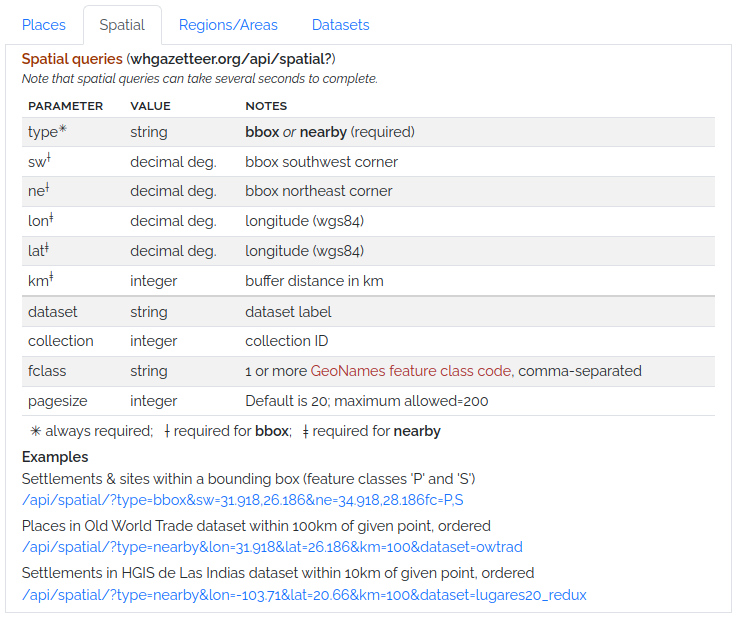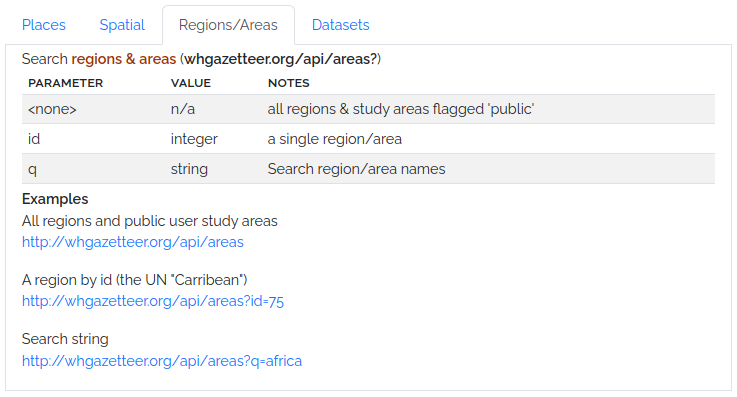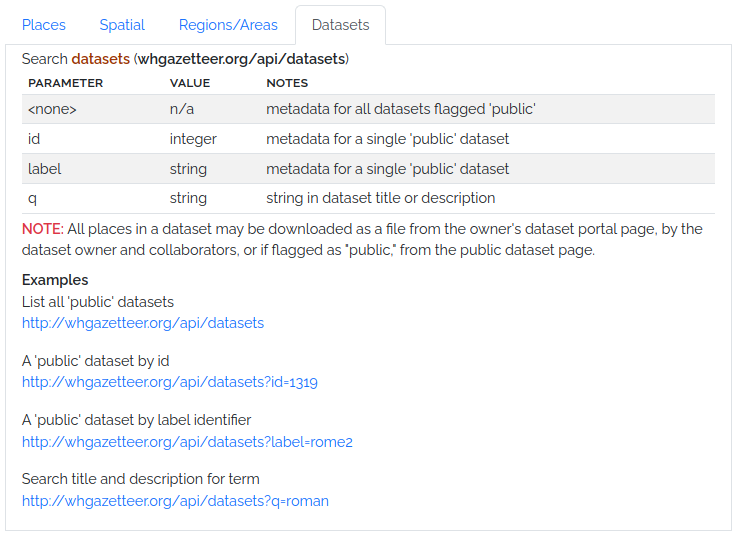Technical¶
API¶
Development of a more complete and well-documented Reconciliation API is in progress (see below). We are refining options and adding endpoints in response to community feedback. Our intention is eventually to offer a Swagger interface like the (unrelated!) example here.
In the meantime, the endpoints illustrated here are available for use, but are liable to change without notice.




Reconciliation API¶
The WHG Reconciliation API provides standardised endpoints for reconciling place names and exploring additional properties of candidate places. It implements portions of the Reconciliation Service API v0.2, a widely-used protocol for data matching on the Web. It is compatible with OpenRefine.
⚠️ Work in progress: This API will require API tokens for authentication. Registered Users will be able to generate a token through their Profile page.
Endpoints, fields, and behaviours are only very partially implemented, and are subject to change.
Endpoints¶
/reconcile/¶
Accepts POST requests with one or more place name queries.
Returns candidate matches for each query, including:
Canonical name
Alternative names
Match score (normalized 0–100)
Exact match flag
Always returns a top-level GeoJSON FeatureCollection of candidate geometries for visual disambiguation.
Batch requests are supported, with a configurable limit (
batch_size).Authentication via API token (
Authorization: Bearer <token>) or session/CSRF.
Parameter usage¶
Each query object in the queries payload supports the following parameters:
Parameter |
Type |
Description |
|---|---|---|
|
string |
Free-text search string. Required if no spatial ( |
|
string |
Search mode: |
For a configured fuzzy search, you may instead specify the |
||
|
array |
Restrict to specific feature classes (e.g. |
|
integer |
Start year for temporal filtering. |
|
integer |
End year for temporal filtering (defaults to current year if omitted). |
|
boolean |
If |
|
array |
Restrict results to country codes (ISO 2-letter). |
|
object |
GeoJSON geometry collection restricting results spatially (e.g. a bounding polygon). |
|
float |
Latitude of the centre for a circular “nearby” search (required together with |
|
float |
Longitude of the centre for a circular “nearby” search (required together with |
|
float |
Radius in kilometres for a circular “nearby” search (required together with |
|
array |
One or more IDs of user-defined stored areas; geometries are resolved server-side and used as spatial filters. |
|
integer |
Restrict results to a specific dataset ID. |
|
integer |
Maximum number of results per query (default: 100). |
Example requests¶
curl -X POST https://whgazetteer.org/reconcile/ \
-H "Content-Type: application/json" \
-H "Authorization: Bearer <token>" \
-H "User-Agent: notbot" \
-d '{
"queries": {
"q1": {
"query": "London",
"mode": "fuzzy",
"fclasses": ["A","P"],
"start": 1200,
"end": 2050,
"undated": true,
"countries": ["GB","US"],
"bounds": {
"geometries": [{
"type": "Polygon",
"coordinates": [[
[-1.0,51.0],
[-1.0,52.0],
[0.5,52.0],
[0.5,51.0],
[-1.0,51.0]
]]
}]
}
}
}
}'
import requests
url = "https://whgazetteer.org/reconcile/"
headers = {"Authorization": "Bearer <API_TOKEN>", "Content-Type": "application/json"}
payload = {"queries": {"q1": {"query": "Glasgow"}}}
response = requests.post(url, json=payload, headers=headers)
print(response.json())
/reconcile/extend/propose¶
Accepts POST requests.
Returns suggested additional properties that clients may request for each candidate:
Temporal range (years)
Source dataset
Country codes
Alternative names
/reconcile/extend¶
Accepts POST requests with candidate places.
Computes and returns values for additional properties.
/suggest¶
Accepts POST requests to suggest entities or properties.
/preview/¶
Accepts POST requests with reconciliation results (JSON payload from /reconcile/).
Returns rendered HTML showing candidate geometries on a map (Point, LineString, Polygon).
Supports OpenRefine preview.
Example:
curl -X POST https://whgazetteer.org/reconcile/ \ -H "Content-Type: application/json" \ -H "Accept: text/html" \ -H "Authorization: Bearer <token>" \ -H "User-Agent: notbot" \ -d '{ "results": { "q1": { "result": [ ... ], "geojson": { "type": "FeatureCollection", "features": [ {"type":"Feature","properties":{"name":"Test Point"},"geometry":{"type":"Point","coordinates":[0,0]}}, {"type":"Feature","properties":{"name":"Test Line"},"geometry":{"type":"LineString","coordinates":[[-10,0],[10,0]]}}, {"type":"Feature","properties":{"name":"Test Polygon"},"geometry":{"type":"Polygon","coordinates":[[[-5,-5],[-5,5],[5,5],[5,-5],[-5,-5]]]}} ] } } } }'
Notes¶
Geometries are always returned to allow visual disambiguation of candidates.
This API is compatible with OpenRefine using the Reconciliation Service API protocol.
The extended reconciliation results use the WHG Place schema, which is available at: https://whgazetteer.org/static/whg_place_schema.jsonld
Code Repositories¶
The WHG codebase is divided into several GitHub repositories, each with a specific focus:
WHG PLACE (Place Linkage, Alignment, and Concordance Engine)
This repository contains the Kubernetes server configuration files for deploying and managing the World Historical Gazetteer (WHG) application. It provides a dedicated space for configuring and orchestrating the server environment.
This repository contains the codebase for the WHG v3.0b application. It is a Django-based web application that provides a user interface for uploading, reconciling, and publishing historical gazetteer data.
This repository contains the codebase for generation and serving of map tiles for the WHG application. Its functionality will soon be integrated into the WHG PLACE repository.
Issues & Discussions¶
We welcome feedback, bug reports, and feature requests. Please use the GitHub Issues feature in the appropriate repository. We especially welcome contributions to the current Discussions.
